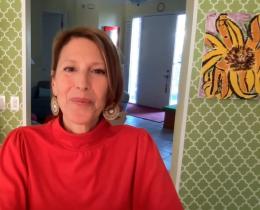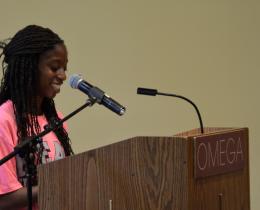Omega: How has your acting career influenced your writing practice?
Maia: It’s the same process, only with different outcomes. Really good acting is about being completely present in the moment. It's about having done your homework and then giving everything up and allowing the flow to move through it.
As an actor I often hear people say, “Oh my God, I got nervous when I walked out on stage.”
And I say, “Yeah, you have to be everything you are in the moment—nerves and all—and then trust that the flow will come.” It’s the same in writing. You have to be very, very present in the moment, aware of everything that’s happening. You have to include everything, and you have to be in a state of no judgment.
My dog sits in on my classes, and every so often he barks in the middle of a meditation. When he does, I often get people writing pieces that have a dog in it, or remembering their childhood dog. It’s all material. It’s all useful for exploration. For me, the acting and the writing are very much one thing. The better my acting gets, the better my writing gets, and vice versa.
Omega: How do you help people bring that present moment experience into their storytelling?
Maia: One of the things I teach is sensory awareness for writers. When you’re in your own inner experience, I ask, "What are you hearing? What are you smelling? What are you tasting, touching, or feeling?" Then you’re really living. Yes, you’re living in imaginary circumstances, but they become alive. They become true through those experiences, and your writing gets deeper and sharper. That sense-memory stuff is all acting technique. Creativity is one flow, and it just has many different outlets.
Omega: Do you think there is a difference between deep writing and personal writing, like journaling?
Maia: I don’t know where along the line journaling got to be considered a bad thing. People often say, “I was just journaling today.” And I say, “Did you put pen on paper? Did you get words out? Did you get some feelings out on the page?” That’s writing. You may not have polished it. You may not know where you’re going to use that information yet.
A few years ago, the Isabella Stewart Gardner Museum did an exhibit of Michelangelo’s sketches. They had hundreds and hundreds of pages where he sketched every corner. It was cats, and rats, and shapes, and all of that. Then they had a couple of big paintings and frescos where you saw how he used those sketches. You could see—there’s the cat, there’s the rat, there’s the shape that he was sketching.
What I’ve been working with my students on lately is that every time they sit down to write, they’re sketching. You don’t know how those sketches will come out, but you don’t go in with that intention. You go in to see what you’re going to mine. It’s not about doing polished work; we can guide and edit the material later. We want to have the unconscious lead us and give us these deeper insights and then we can pick and choose. We can say it goes here; we want to put it there.
I often get calls from people six years down the line who say, “Remember that first piece I wrote in class, that very crazy thing? Guess what? I just figured out where it goes in my novel. That piece wasn’t a wasted piece. It was just a harbinger of things to come, and I didn't see the big picture yet."
Omega: Do you have a favorite book on creativity besides your own?
Maia: There are so many terrific books. I’m extremely fond of Stephen King. I think his book on writing is really awesome. Someone just recommended Vivian Gornick's book that I haven't had a chance to look at yet, but I hear it’s also quite generous and wonderful. For me, anything that is generous, that is giving, that invites people to approach their work with love, joy, and curiosity—those are the books I’m interested in. I’m not so interested in the books that tell you how to do it, or what the rules might be, or what the 10 guaranteed success stories are.
The creative process is all about aiming and missing. It’s about falling on your butt and being willing to make mistakes. We need to be able to risk and fail. We need to be able to try. I say to my students over and over again, “How much does pen and paper cost? Make a bold mistake. You don’t have to show it to anybody. But risk. It’s just words on paper. It’s not brain surgery.”
Omega: What is your favorite word?
Maia: Yes.
And there’s a new word that I’ve come across in this play that I’m working on, which is an exceedingly literary piece by a wonderful playwright named Bryony Lavery. The word is: proleptic. Isn’t that a great word? Proleptic irony. I haven’t even looked it up. I don’t know what it means, but I love it. And I love, at my age, to learn new words and to have something new given to me. I just love the sound of it.
Omega: Do you have a special creative spot on Omega's campus?
Maia: I think all of Omega is a special creative spot. Omega has created such a protected and beautiful energy that the minute you walk onto that campus—actually, the minute I get in the van when I arrive at the train station—the outside world falls away. And that’s the beginning of creative process. You begin to loosen the bonds of your day-to-day life, of the things that the conscious mind has to focus on to keep it fed and clothed and all the other things we have to do. You begin to allow something deeper and more mysterious to happen. It’s a place that’s dedicated to allowing that transition.



